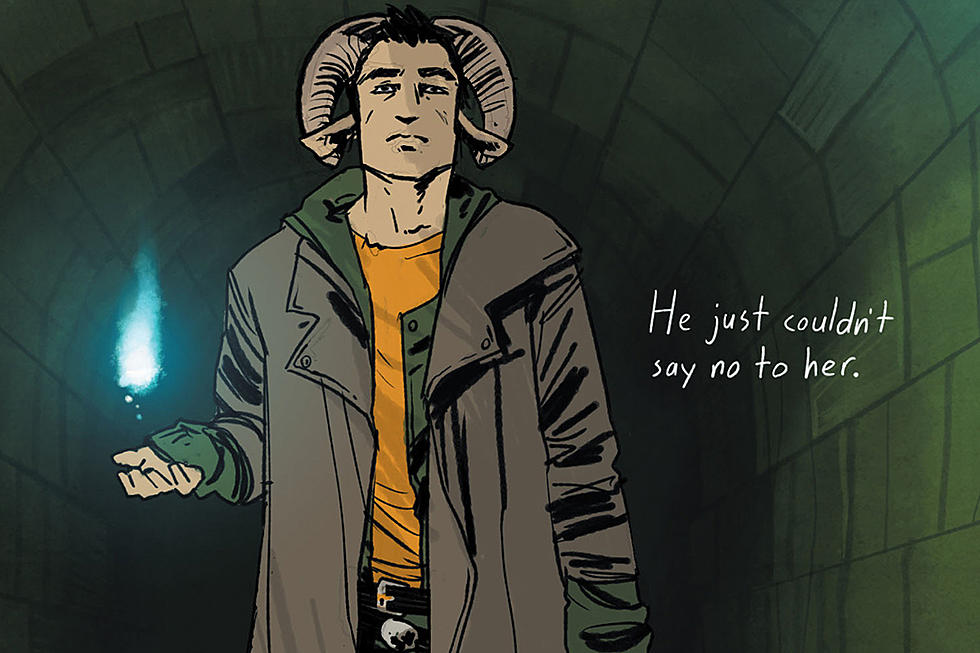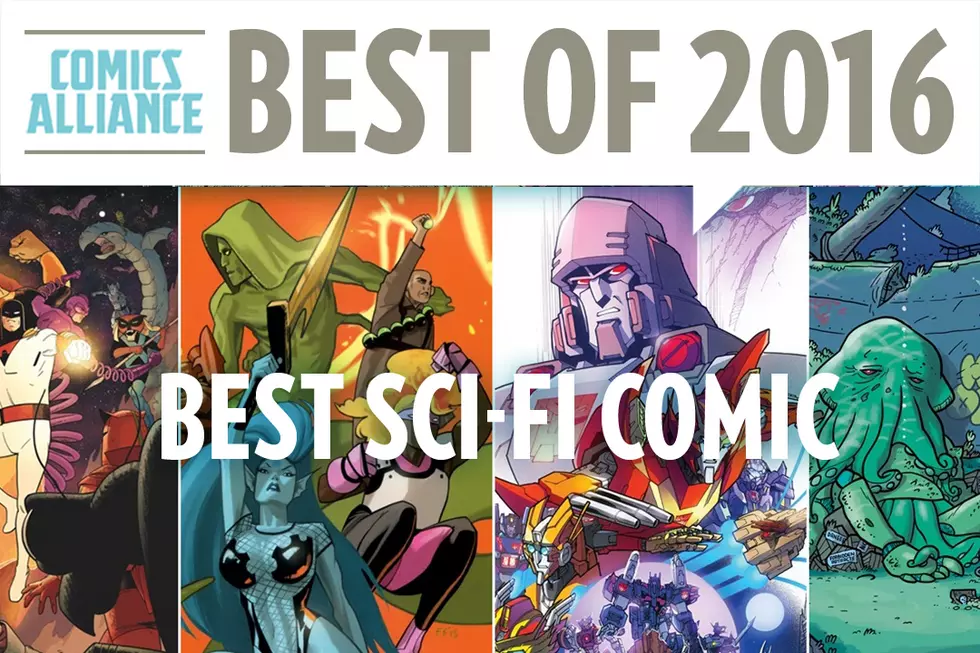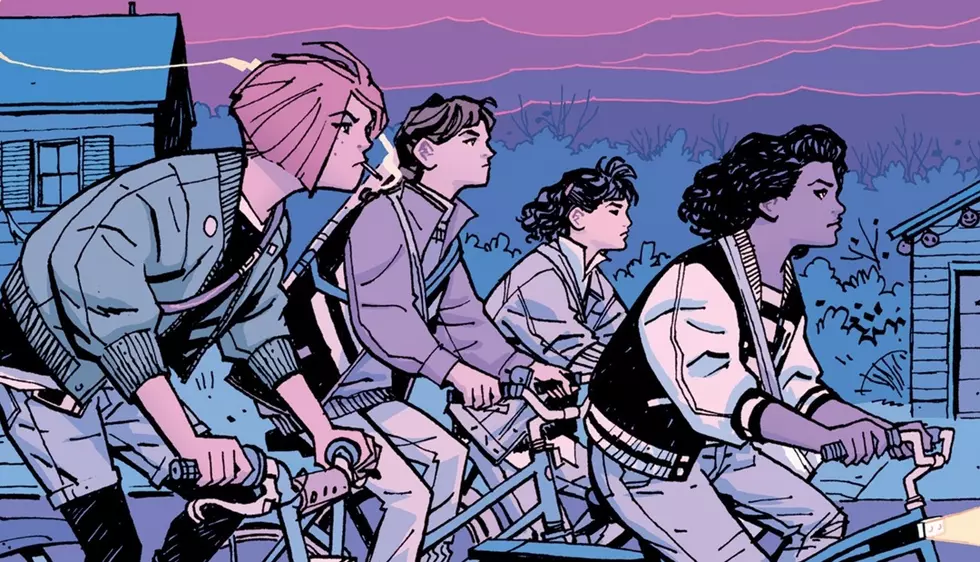![Ex Machina #50 Finale: All Machines Need Power [Review]](http://townsquare.media/site/622/files/2010/08/em50covercropped-1282205125.jpg?w=980&q=75)
Ex Machina #50 Finale: All Machines Need Power [Review]
(IF YOU DID WATCH THE LAST EPISODES OF "BATTLESTAR GALACTICA " AND "LOST" FIRST, DID THINGS SEEM TO MAKE ANY MORE SENSE TO YOU? JUST CURIOUS)

Brian K. Vaughan and Tony Harris' "Ex Machina" ended its run this week with issue #50. Some of you are probably waiting for the trade to read this one. Some of you might even be waiting for a movie adaptation to happen. Some of you might have figured out that I'm using my opening paragraph here to stall for time because there's very little I can say about this issue that doesn't involve enormous spoilers and I wanted to give you a chance to realize that and turn back before it's too late. Vaughan and Harris have created a remarkable ending to one of the most impressive series of the past decade. It should be experienced on its own, free of any advanced knowledge of what happens save that presented within the story itself.Because in their own way Vaughan and Harris have been preparing us for this ending from the beginning. Page 1, issue 1, Mitchell Hundred tells us his story is a tragedy and then proceeds to tell it all, in flashback. The opening page of issue 50 returns to that same scene, Hundred in a dark room, downcast, nursing a drink, pictures of his past triumphs on the walls behind him.
Over the course of the issue, Hundred recaps the events following his 2005 victory over the forces that gave him his ability to communicate with machines and then attempted to invade his universe. At first they're positive. Hundred helps his assistant David Wylie replace him as mayor of New York City and moves on to become U.S. Ambassador to the United Nations, where he gives a speech announcing a plan to rebuild the tower destroyed on September 11th exactly the same as it was before as a memorial. This is the one shining moment for Hundred in the issue, however. Afterwards things all go downhill.

I'm going to cover the three major events of the rest of "Ex Machina" #50 in order of occurrence, starting with Hundred and Bradbury. Bradbury was Hundred's longtime friend and trusted head of security, but he hit hard times after taking the fall for Hundred, switching places so that he was the one arrested in costume as the Great Machine following the events of issue 49. His life has practically fallen apart, he's unkempt, he just attacked his ex-wife for threatening to stop him from visiting his kids and in this time of greatest need he seeks help from Hundred.
Hundred doesn't have time for this. He's about to announce his candidacy for President of the United States in the 2008 election and tells Bradbury to go away and turn himself into the police. Pushed to a breaking point, Bradbury makes a startling admission. He tells Hundred that he loves him. Hundred is struck with disbelief, and as Bradbury moves closer to him, Hundred is on the verge of tears before he pushes Bradbury away. Bradbury reacts violently and angrily, telling Hundred never to speak to him again and calling him a "faggot" as he storms off. It's the last we see of him.
This marks the first time in this issue we see Hundred pushing those close to him away because they pose a threat to his ambitions of power. Hundred has come to confuse the perceptions of the power available to political offices like President with the very real power he had as a superhero with unique abilities, and has come to desire the power he doesn't have more than the power that he does.
Hundred's final encounter with Kremlin, his other trusted friend from his Great Machine days, is even more shocking. Interrupted from a presidential campaign stop by a sudden text message from Kremlin, Hundred returns to New York. Kremlin threatens to reveal evidence that Hundred fixed the first vote that elected him as mayor of New York to intimidate Hundred into returning to the life of a costumed crime fighter. But Hundred insists that there's still a threat and that he'd better be able to fight it as President than as the Great Machine. Kremlin counters by brandishing a gun and threatening to kill himself if the Great Machine won't return.
And after learning that Kremlin hasn't mentioned the vote fraud evidence to anyone else, Hundred orders the gun to fire, killing Kremlin and taking the evidence. Hundred's desire for power is pushing him, and in that single moment of stress he was unable to hold it back. He saw a threat to the power he thought he needed, a way to deal with it, and without thinking he acted on impulse and killed his friend. Perhaps the force inside Hundred's head forced his hand, took over in a moment of weakness. Perhaps it was all Hundred. Whatever the cause, despite the initial regret and shock Hundred seems to feel for what he's done, his first and only concern is himself. He does not step forward to take responsibility for what he's done. This is the moment when Hundred crosses the line from flawed hero to a tragic, fallen hero bordering on a monster.

And then there is the third twist, the revelation that when Hundred's presidential campaign failed he went on to run as a candidate for Vice President under John McCain, ultimately helping McCain to win the election. Seeing Hundred talking to McCain on the phone is crushing. He started the book as a proudly independent elected official with no party affiliation, and now he's a yes man offering polite thank yous and best wishes to his boss. At no point in the conversation is there any indication that Hundred has achieved the kind of power he sought or that he is any better placed to protect the world from the threats he fears.
In all his quest for power, Hundred ends up with what's joked to be the least powerful position in Washington, a figurehead used by others to further their own agendas. More painful to watch, though, is the fleeting smile that briefly covers his face as he looks at a photo of himself, Bradbury and Kremlin from their crime fighting days. Because what it says is despite all he's pushed away, despite the terrible things he's done, there's still something of the old Mitchell Hundred in there who regrets what this has all come to. But whatever part of him remains that feels that way is too weak to do anything now.
Seeing what Hundred ultimately becomes casts a different light on an earlier event in the issue. Before his final meeting with Bradbury, Hundred has a nightmare. He sees different versions of himself from parallel universe working for the beings whose plans he thwarted in issue 49. They threaten that they'll return some day. And worse, they tell him that in most of the parallel universes they've visited that the version of Mitchell Hundred there has joined their side rather than fought against them. Mitchell uses this fear as a justification for his run for President, which ultimately leads to him sacrificing those who've helped him most.
Hundred always spoke of hating party politics, but in the end he is absorbed into the political machine, making compromises that he thought would give him what he wanted but getting nothing in return. If Hundred's fears are correct and his world is destined for another invasion attempt, at best he seems likely to fail, with the people he could truly count on now all gone from his life. At worst Hundred may even be on the path to becoming one of the Mitchell Hundreds who sides with the invading forces. We've seen him side with groups he's previously condemned. We've watched him betray and kill friends. Is it so hard to believe that the right argument and the right offers of a power to make a difference might turn make him do the same on a larger scale?

And so at least for me, the ending of "Ex Machina" isn't as ambiguous as it might initially seem. Mitchell Hundred had power once, a unique power that offered the world something no one else could. He traded that in for another kind of power he thought could better help people. When he found that wasn't enough power, he kept grabbing for more and more, but never found enough to do what he wanted to do. In the process his friends' lives were destroyed. And now, most likely, his world is doomed.
It's not, as Hundred himself says, a happy ending or the kind of ending you'd normally see in superhero books. It's going to be difficult for some fans of the book and particularly fans of Hundred the character to swallow, especially given how many sudden surprises occur over the course of this final issue. In some ways this might have worked better as a three or four issue concluding arc instead so the motivation for some of Hundred's choices and their subsequent impact could have been more fully explored. But all we really need to get the book is those last two pages, watching Hundred's silent realization that he already had what he really wanted, only to trade it away for nothing of value.
More From ComicsAlliance








![Aftershock Announces New January Books ‘Blood Blister’ and ‘Animosity: The Rise’ [NYCC 2016]](http://townsquare.media/site/622/files/2016/10/covers_featured.jpg?w=980&q=75)
